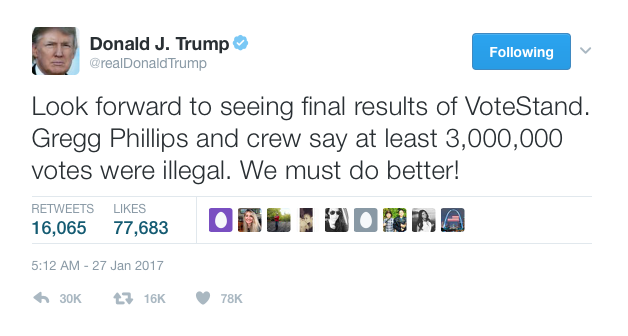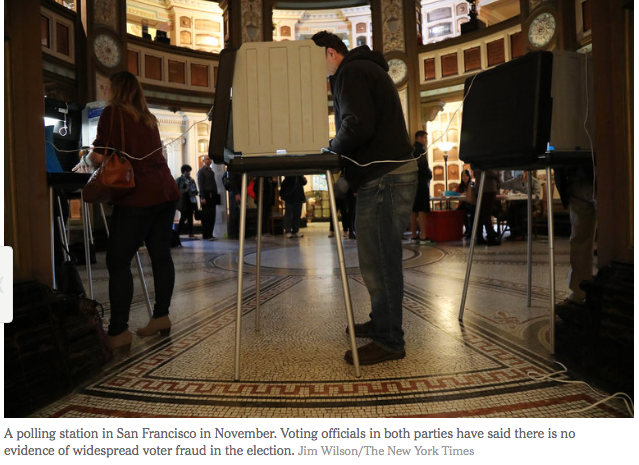By Jonathan Martin Jan. 27, 2017
WASHINGTON — To support his call for a sweeping federal inquiry into his claims of vast voting fraud, President Trump turned on Friday to a little-known conservative activist whose work on the issue has been widely discredited and who has trafficked in conspiracy theories.
“Gregg Phillips and crew say at least 3,000,000 votes were illegal,” Mr. Trump wrote on Twitter, a reference to a claim by Mr. Phillips, who helped create an app to report voter fraud, that he had “verified” such irregularities. With those words, Mr. Trump bestowed the imprimatur of the presidency on new ground: the feverish online fringes of American politics.
In elevating Mr. Phillips, who last month on Twitter cited “spook friends” to claim that “the Israelis impersonated the Russians” and interfered in the American election, Mr. Trump returned to a familiar pattern.
After a campaign in which he gave voice to outlandish falsehoods, including claims that Justice Antonin Scalia was suffocated by a pillow and Senator Ted Cruz’s father had a connection to the assassination of President John F. Kennedy, Mr. Trump has not left his penchant for conspiracy-mongering at the White House door.
And he is fixated on an issue that he raged about both during the campaign and in the weeks after his victory: the integrity of the country’s voting procedures. After his loss by about three million votes in the popular vote, and the questions about his legitimacy that have followed, he is now pushing for an investigation that could cost millions of dollars.
On Monday, Mr. Trump shocked congressional leaders at a White House reception by recounting a story he said he had heard from Bernhard Langer, a professional golfer, about voters in Florida he assumed to be illegal. (Mr. Langer later said that he had never talked to Mr. Trump about voting, but had only passed along an anecdote he had heard from a friend to another friend, “who shared it with a person with ties to the White House.”)
On Wednesday, the president explained on prime-time television why he had lost the popular vote. “Of those votes cast, none of them come to me,” Mr. Trump told ABC News about what he has called millions of illegal votes. “They would all be for the other side.”
And then, early Friday, he saw a segment on CNN’s early-morning show in which Mr. Phillips argued without evidence that as many as three million people had voted illegally. “Look forward to seeing final results of VoteStand,” Mr. Trump wrote on Twitter 47 minutes after the CNN interview, referring to Mr. Phillips’s app. “Gregg Phillips and crew say at least 3,000,000 votes were illegal. We must do better!”

Election experts aligned with both major parties say that no such mass election fraud took place.
“We are not aware of any evidence that supports the voter fraud claims made by President Trump, but we are open to learning more about the administration’s concerns,” the National Association of Secretaries of State said in a statement.
The Ohio secretary of state, Jon Husted, a Republican, said he had found sporadic examples of voting by foreign citizens in Ohio elections — 44 total instances in his state in the 2012 and 2014 elections. “This can happen not for any nefarious reasons,” he said, as when foreign students sign up during campus drives.
It is clear, however, that Mr. Trump will not accept any such benign explanation. He is forcing even his own advisers into some awkward contortions, as they try to focus on the broader, less explosive matter of individuals’ being registered in multiple states.
“I think the president has certainly expressed his concerns on this issue, as recently as the last 24 hours,” Vice President Mike Pence told congressional Republicans at a private meeting this week, according to audio obtained by The New York Times.
Mr. Pence vowed “a full evaluation of voting rolls in the country, the overall integrity of our voting system, in the wake of this past election, just because so many Americans share the concern you have, I have, the president certainly has, about people being registered in multiple states.”
But what worries voting rights activists is that the administration’s focus on the issue will embolden states that have tried to restrict voting access to take further steps.
Mr. Husted, who is planning to run for governor next year, said there was little political upside for Republican officials to challenge Mr. Trump on this front. “I’m not interested in fighting with our new president over these things, because I want him to be successful, and he is doing a lot of things that could be good for America,” he said.
Though many leading Republicans would prefer to avert their gaze, the president has found an ally in Mr. Phillips, a longtime Republican operative who was the executive director of the Mississippi state party in the 1990s.
Less than a week after the election in November, conspiracy theory websites started reporting that millions of people had voted illegally, with many of the articles pointing to a Twitter post from Mr. Phillips claiming that he had proved it. “We have verified more than three million votes cast by non-citizens,” he wrote.
In subsequent Twitter messages, Mr. Phillips promised “legal action” and said he was consulting lawyers. But he refused to release his data to reporters, saying the news media would “spin” the story against him.
Mr. Phillips, who did not respond to a voice mail message seeking comment, offered no evidence in the CNN interview. “It will probably take another few months to get this done,” he said.
Friends and associates of Mr. Phillips say he is a political journeyman who is given to great flights of passion about politics and, as in the CNN interview, can find himself in rhetorical cul-de-sacs.
A native of Montgomery, Ala., he had a quick rise in Deep South politics, working first in his home state before moving to Mississippi to work for Kirk Fordice, a Republican governor there in the 1990s. He later moved to Texas, where he became the second-ranking official at the state’s Health and Human Services Commission and became enmeshed in controversies about his business ties. In 2005, for example, The Houston Chronicle reported that Mr. Phillips had “played a role in a major state contract” being awarded to a former employer.
Despite his roots in the establishment wing of the party, he has become more of a hard-liner in recent years and has seized on the issue of election integrity. “We watched them steal this election,” Mr. Phillips said to Breitbart News in 2014, accusing Senator Thad Cochran of Mississippi of foul play after the veteran Republican incumbent fended off a Tea Party primary challenge, thanks in part to support from the state’s black voters.
But then as now, there was no proof of any widespread voting fraud.
A New York Times survey in December of secretaries of state or law enforcement officials in 49 states found that 26 states had recorded no credible allegations of fraud in the November general election. Nearly all of the remaining states reported only a small number of fraud accusations, and none reported widespread or organized fraud efforts.
One of the most rigorous academic investigations of the topic, by Lorraine C. Minnite, a Rutgers University political scientist, led to a 2010 book, “The Myth of Voter Fraud.” Dr. Minnite examined thousands of voter-fraud complaints in four states — California, Minnesota, New Hampshire and Oregon — and found only scattered verifiable instances of wrongdoing.
Justin Levitt, a professor and expert on election administration at Loyola Law School in Los Angeles, sought evidence to support one of the most common allegations: that some people — usually illegal immigrants or unregistered inner-city residents, a clear reference to African-Americans — go to polling places and personally cast ballots illegally. That is the sort of fraud that Mr. Trump railed against on the campaign trail last autumn, and it appears to be the fraud that he now claims took place. But in 2014, Dr. Levitt wrote that after surveying in-person fraud claims made since 2000, he had uncovered only 31 credible allegations out of more than a billion votes cast. And many of those, he wrote, had not been verified.



You must be logged in to post a comment Login